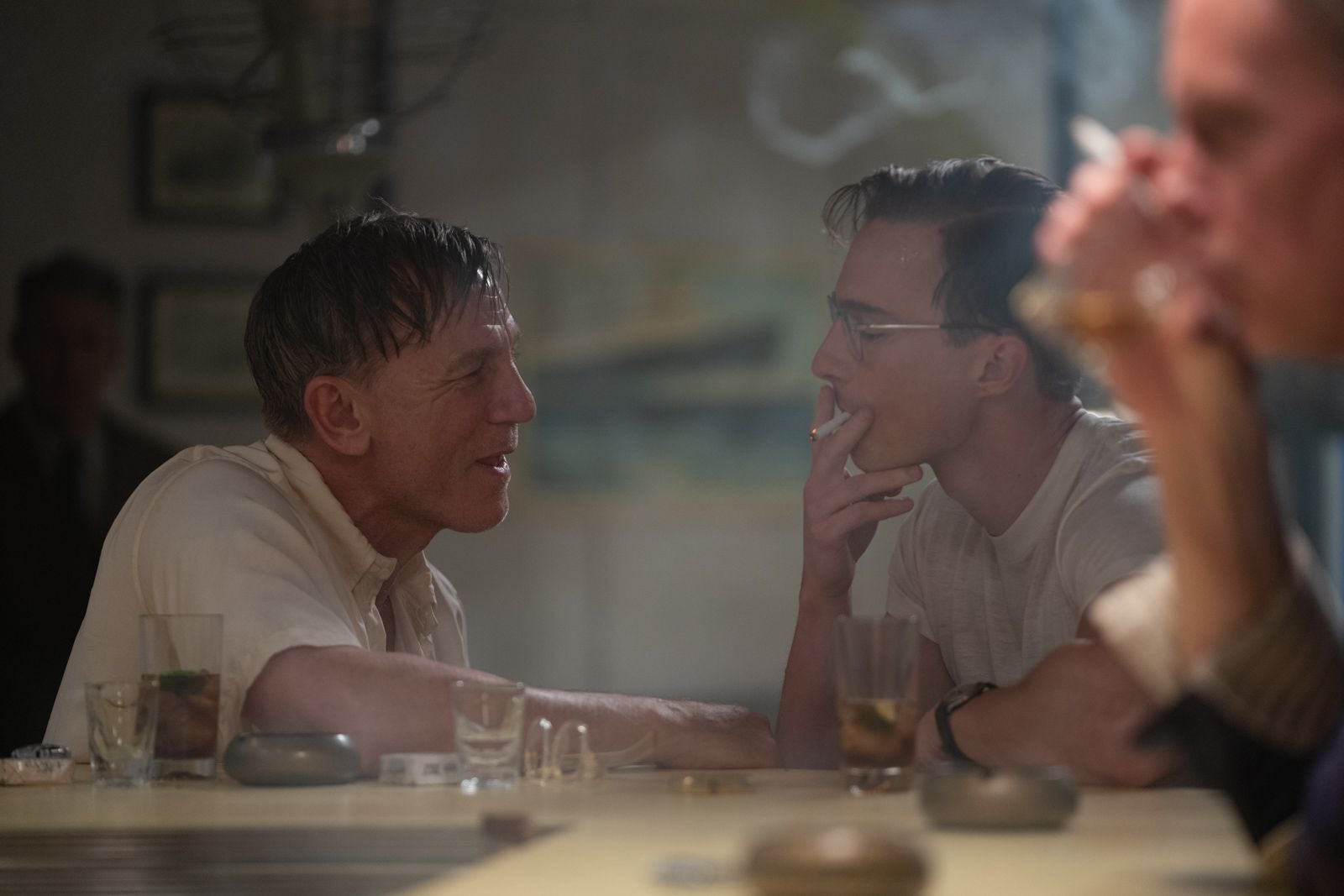
Film Critic Anastasia May finds Queer to be a gripping warped love story
This adaptation of William. S. Borough’s semi-autobiographical novel, Queer (1985), explores the raw and troubling effects of the body wanting more than the mind can manage. Luca Guadagnino is one of the most relevant and talented directors of the last decade, and last year his adrenaline-pumped sport drama Challengers cemented him further in cinema relevancy. Three different locations section this movie into chapters, incorporating the spirit of Borough’s novel. The pacing felt fast enough to grasp the characters and their receptive flaws, but a gradual slow burn unfolds through delicate touches, imagined confessions and disembodiment.
This film is unassumingly dramatic, with queer reflections and imagery bringing viewers back to Call Me by Your Name in combination with a similar use of the body seen in his 2022 release, Bones and All. After seeing the trailer, I was excited to watch a Giovanni’s Room style of story with the heat of Mexico City pulsing the movie alive, but it was much more than that. The lead protagonist, ex-pat William Lee (Daniel Craig), meets allusive and youthful fellow American, Eugene Allerton (Drew Starkey) over the course of many nights filled with tequila and rum and cokes. The first third of the movie is set in 1950s Mexico City, with picturesque miniatures used and sweaty smoky bars accompanying the characters through the dry heat of a city, with only cigarettes to smoke and men to dote over.
Sayombhu Mukdeeprom’s cinematography remains naturalistic, even throughout the strange dream sequences of submerged nude bodies and doorways that lead to darkness. He continues to capture an iridescence alike to his style in Call Me by Your Name, the pure and innocent appearance to a Guadagnino film. The music is impeccable, filling spaces words could not, featuring clarinets and tremolos of strings only the heart could feel, done by Trent Reznor and Atticus Ross who also scored Challengers. The soundtrack also features Sinead O’Connor and Nirvana, which didn’t take the action out of the 1950s but cemented the sensual focus of the movie.
“The music is impeccable, filling spaces words could not
Craig’s performance was a standout, as expected, with qualities unseen so far in his career, though echoes of his 2003 portrayal of Ted Hughes in Sylvia come through. Lee is greedy, needy, emotional and weak in this erotic drama, and his character is in search of telepathy, with drugs or no drugs wishes to replicate this feeling with his sexuality. In Craig’s career this role has come up at a time when he wishes to remove himself from the character of James Bond grounding his acting and talent in an entirely new genre and style. Regarding the hyper-masculine studded spy, Craig plays a good contrast in a regulation white linen suit desperate for a high or a body who can replicate it.
“Craig’s performance was a standout
Starkey’s closed-off character is hard for even the audience to understand. His recoils from touch and sudden passions make viewers feel bad for the way Gene treats his older lover. This is not a fault to the performance in any way, and Starkey encapsulates this fleeting love that impacts a lifetime delicately. Starkey plays Eugene with a playful incandescence, tainted by the sexual want he is confronted with for Lee; you can’t help but fall for him. His performance exudes the youth a first love or obsessive lust has, with a physical warmth that brightens the film’s dark themes. This role has also come at a perfect time in Starkey’s career, from playing Rafe Cameron in Netflix’s teen drama, Outerbanks, to seamlessly moving his career into cinema, a talent to look out for in the future.
Lesley Manville plays a fierce Yage expert, the telepathy-inducing drug Lee searches and is unrecognisable in her penultimate section of the film. She brings comedy that doesn’t upset the nature of the film but provides rest bite for the viewer, removed from the world William Lee’s tortured brain. Gene’s friend, Joe, is played by Jason Schwartzman, another comedic relief of the film as items of his are stolen by the male lovers he invites into his home. His performance highlighted Lee as more serious and emotional around having a lover, and what it means to be queer in a post-war 1950s.
Verdict
This movie lived up to Guadagnino’s style and previous work, new features established too, with its distinct beauty and aestheticized cinematography. Almost-perfect casting and chemistry produced a quiet tragedy and pain that surface level desire hides at first watch.
9.5/10
Enjoyed reading this? Read more from film:
Comments